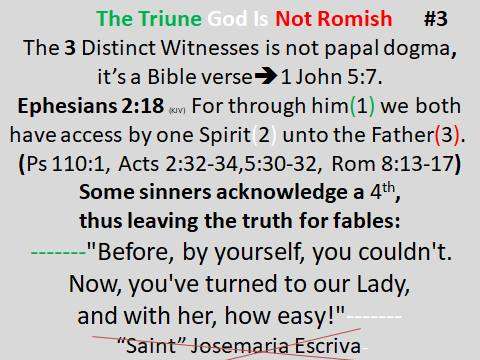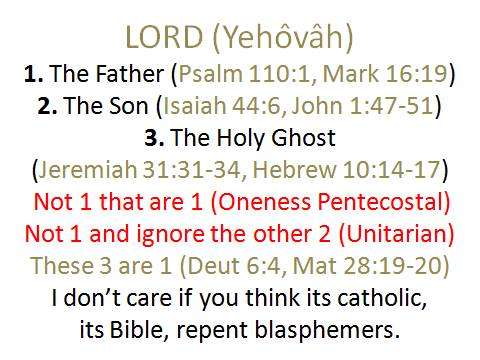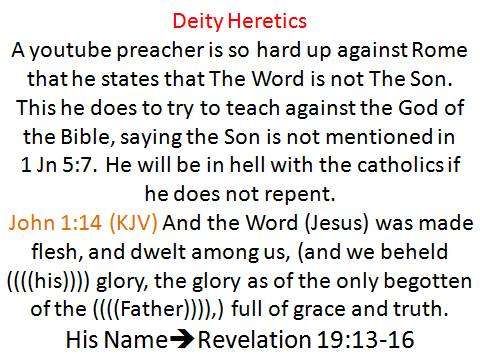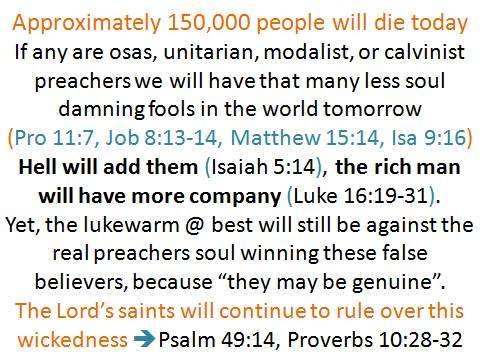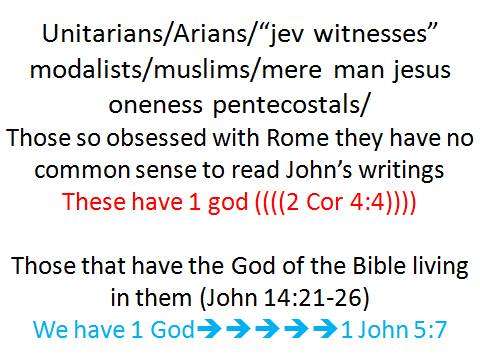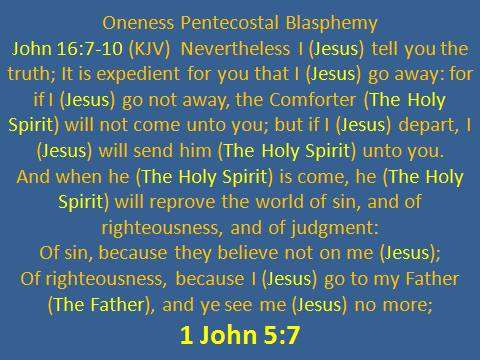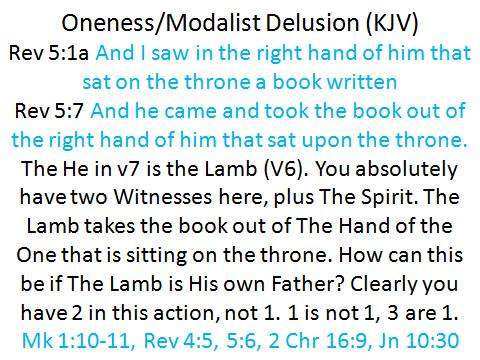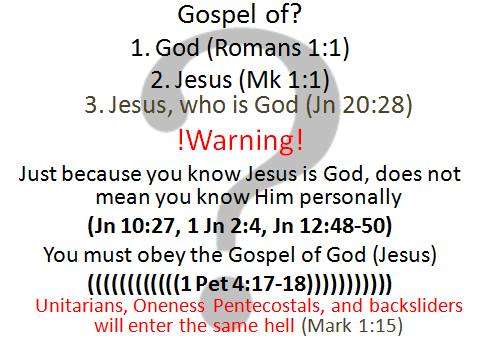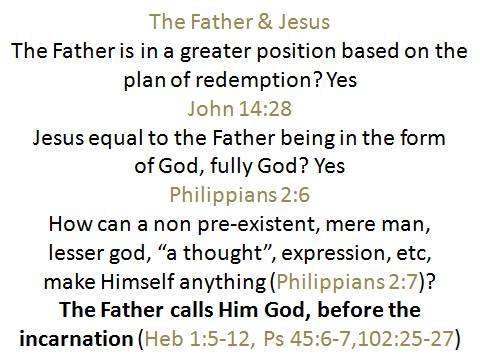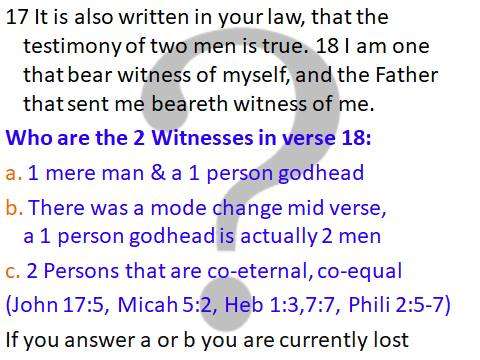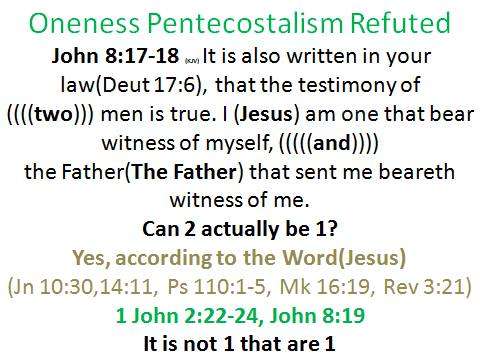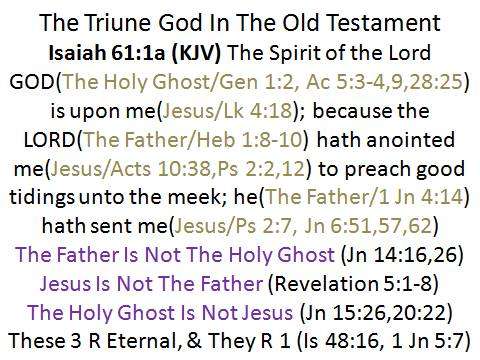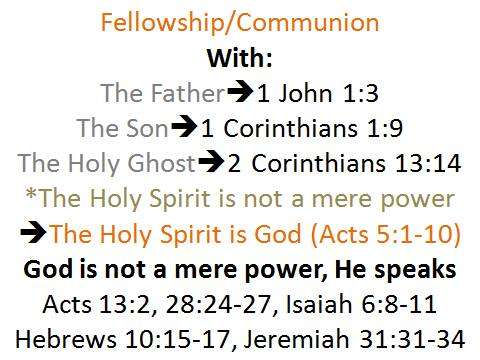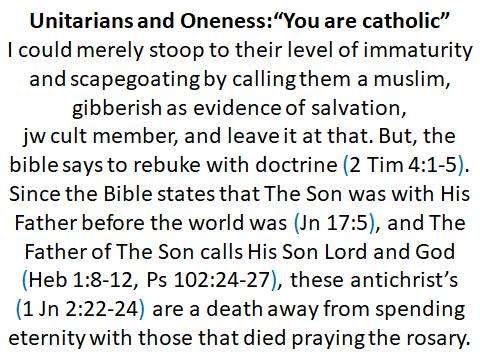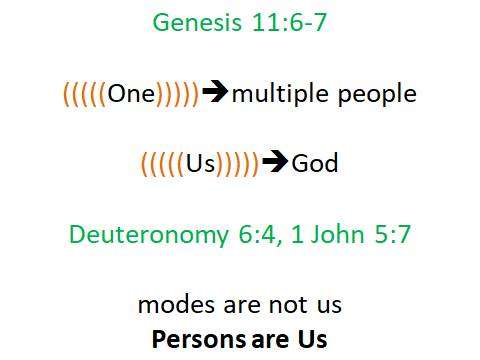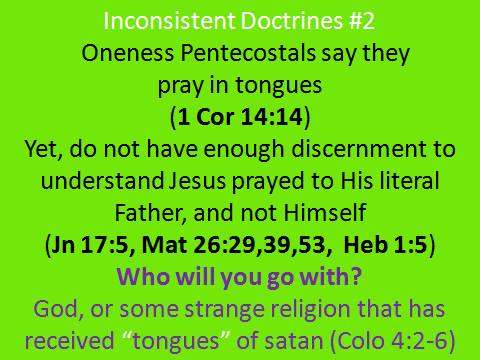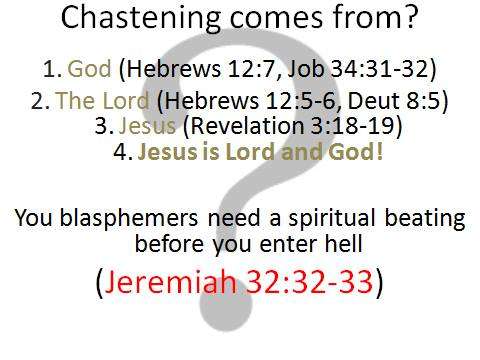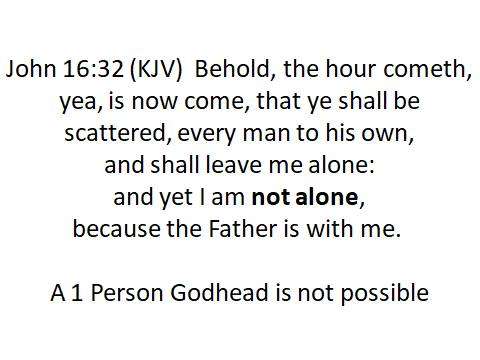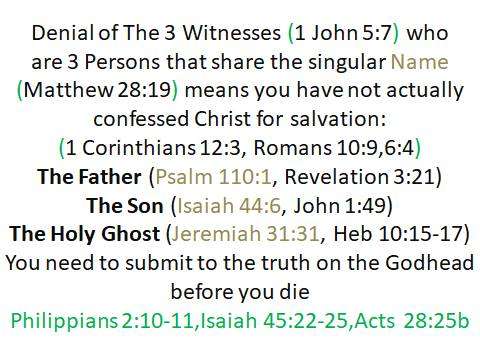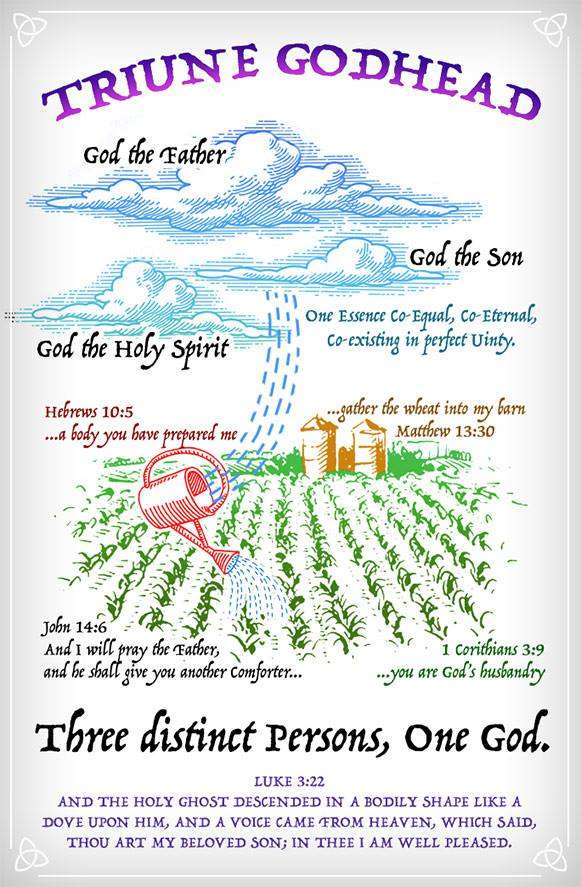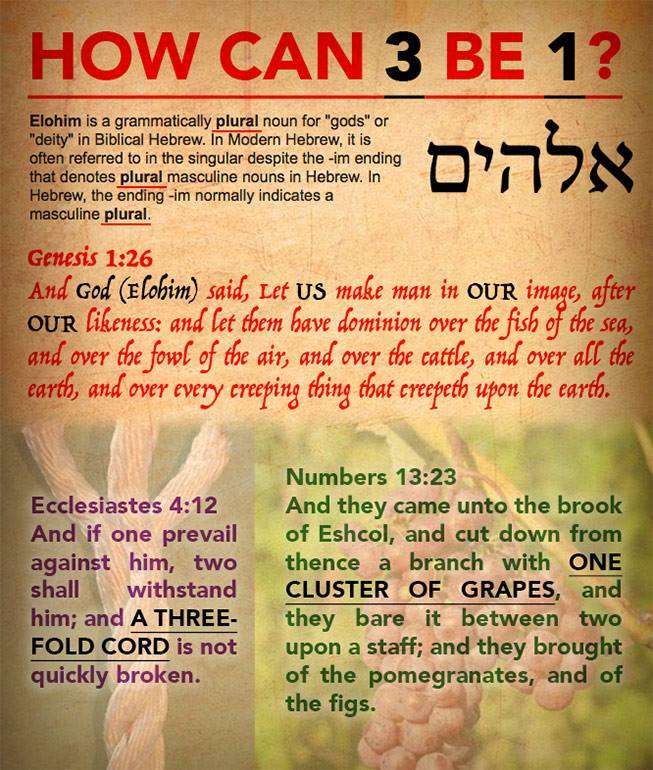
THE GODHEAD – 3 PERSONS/ONE GOD – TRINITY
This is truly elementary. If you deny the 3 persons of the Godhead, you are a hellbound heretic. You deny the SON you deny the FATHER! Oneness (Pentecostals), Modialists, Unitarians, etc, you are all heading straight to hell lest you repent. We have another detailed teaching here. GOD could not be more clear on this subject:
Eph 5:22 Wives, submit yourselves unto your own husbands, as unto the Lord.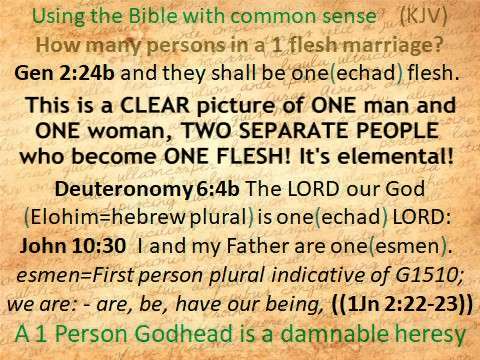
Eph 5:23 For the husband is the head of the wife, even as Christ is the head of the church: and he is the saviour of the body.
Eph 5:24 Therefore as the church is subject unto Christ, so let the wives be to their own husbands in every thing.
Eph 5:25 Husbands, love your wives, even as Christ also loved the church, and gave himself for it;
Eph 5:26 That he might sanctify and cleanse it with the washing of water by the word,
Eph 5:27 That he might present it to himself a glorious church, not having spot, or wrinkle, or any such thing; but that it should be holy and without blemish.
Eph 5:28 So ought men to love their wives as their own bodies. He that loveth his wife loveth himself.
Eph 5:29 For no man ever yet hated his own flesh; but nourisheth and cherisheth it, even as the Lord the church:
Eph 5:30 For we are members of his body, of his flesh, and of his bones.
Eph 5:31 For this cause shall a man leave his father and mother, and shall be joined unto his wife, and they two shall be one flesh.
Eph 5:32 This is a great mystery: but I speak concerning Christ and the church.
Eph 5:33 Nevertheless let every one of you in particular so love his wife even as himself; and the wife see that she reverence her husband.
The Bible repeatedly asserts that God is ONE. He is one God (James 2:19): and one Jehovah (Deut 6:4). However, nowhere in Scripture are we ever told that God is one person. The Bible teaches there is one God manifest in three persons: God the Father, God the Son, and God the Holy Spirit. Oneness Pentecostalism teaches that Jesus is the Father, He is the Son and He is the Holy Spirit. This is blatant heresy! Hence the name, Jesus Only. However, evidence from the Word of God clearly refutes this erroneous doctrine which dishonors the Godhead. Indeed, the Scripture does state there is one God, but the word “one” relates to unity as well as number. For example, 1 John 5:7 communicates the Godhead as being one in unity while carefully preserving the distinction of persons within.
1 John 5:7 “For there are three that bear record in heaven, the Father, the Word, and the Holy Spirit: and these three are one.”
The three are spoken of as one in number and yet treated individually in Scripture. There is one God the Father, one Lord Jesus Christ, and one Holy Spirit.
1 Cor. 8:6 “But to us there is but one God, the Father, of whom are all things, and we in him; and one Lord Jesus Christ, by whom are all things, and we by him.”
Thus there are three separate persons in divine individuality and divine plurality. The Father is called God…
1 Cor. 8:6 “But to us there is but one God, the Father…”
The Son is called God…
John 1:1-2 “In the beginning was the Word, and the Word was with God, and the Word was God. 2 The same was in the beginning with God.’
And the Holy Spirit is called God…
Acts 5:3-4 “But Peter said, Ananias, why hath Satan filled thine heart to lie to the Holy Spirit, and to keep back part of the price of the land? 4 Whiles it remained, was it not thine own? and after it was sold, was it not in thine own power? why hast thou conceived this thing in thine heart? thou hast not lied unto men, but unto God.”
Individually, each is called God; collectively, they can be spoken of as one God because of their perfect unity. The word”God” can be used either in the singular or in the plural, like the word sheep. Everything that could pertain to God collectively could also apply equally to each member of the Godhead as individuals. However, there are some particulars which relate to each individual person of the deity as to position, office, and work that could not be attributed to either of the other members of the Godhead. For instance, the Father is the head of Christ…
1 Cor. 11:3 “But I would have you know, that the head of every man is Christ; and the head of the woman is the man; and the head of Christ is God.”
The Son is the only begotten of the Father…
2 John 1:3 “Grace be with you, mercy, and peace, from God the Father, and from the Lord Jesus Christ, the Son of the Father, in truth and love.”
The Holy Spirit proceeds from both the Father and the Son…
John 14:16 “And I will pray the Father, and he shall give you another Comforter, that he may abide with you for ever…”
PLURALITY IN SCRIPTURES
The names of God prove plurality of persons. The Hebrew word Elohim, translated “God” in Genesis 1:1 and also in more than 2,700 other places in the Old Testament, is a uni-plural noun which means “more than one.” Had the sacred writer been led to use the singular El, then there would have been no indication of a divine plurality. But in this initial reference to God, he was led of the Holy Spirit to pen the Word Elohim.
Genesis 1:1 “In the beginning God (Elohim) created the heaven and the earth.”
Also when one considers that the word Elohim is used about ten to one over the word El, we would have to conclude that this preference for the plural over the singular indicates a definite sign of plurality in the Godhead. Genesis 3:22, where it says, “the man has become as one of us,” proves plurality of persons by the use of the pronoun “us.” Two Lords are mentioned in Genesis 19:24–one on earth and one in heaven. Two Lords sit side by side in Psalms 110:1-5, in Matthew 22:44, and in Acts 2:33-34, 36. Two and three Persons are mentioned in the introductions to many New Testament books: Romans, James, I Corinthians, I Peter, to name a few.
JESUS IS NOT THE FATHER
We know from the Word of God that while Jesus was on earth the Father was in heaven…
Matthew 5:48 “Be ye therefore perfect, even as your Father which is in heaven is perfect.”
Consider Jesus praying, “Let this cup pass from Me.”
Matthew 26:39 “And he went a little farther, and fell on his face, and prayed, saying, O my Father, if it be possible, let this cup pass from me: nevertheless not as I will, but as thou wilt.”
Here, Jesus in the Garden of Gethsemane,right before His betrayal. He was praying to the Father about the ordeal He was about to undergo. Several points are worth bringing out here. First, in this passage, Jesus addresses the Father. He says, “Oh my Father…” Note that Jesus says “my” and “Father.” These two words designate a “me and you” relationship. Second,“If it be possible” is Jesus expressing a desire, a hope. What is that hope or desire? It is that “this cup pass from me.” The cup Jesus is speaking of is the immanent ordeal of betrayal, scourging, and crucifixion. Jesus did not want to go through this. He was expressing His desire. It was His will not to undergo the severe ordeal ahead of Him. If this was not so, He would not have expressed the desire to have the cup pass from Him. Third, Jesus says, “Nevertheless., not my will, but thine, be done.” With this, Jesus is expressing His will and contrasting it to the will of the Father. Yet ,He is stating that even though He does not want to undergo what lay ahead,“Nevertheless,” He would submit to the will of the Father.This shows that the person of Jesus had a separate and different will than the Father. Since we have two separate simultaneous wills, we have two separate and simultaneous persons and Oneness Pentecostal theology is incorrect.
We also know that Christ now sits at the right hand of the Father…
Hebrews 12:2 “Looking unto Jesus the author and finisher of our faith; who for the joy that was set before him endured the cross, despising the shame, and is set down at the right hand of the throne of God.”
Jesus also said He would confess men before His Father which was in heaven, proving He (Jesus)is not Himself the Father…
Matthew 10:32 “Whosoever therefore shall confess me before men, him will I confess also before my Father which is in heaven.”
Jesus was the only begotten Son of the Father. Hence, Jesus could not be the Father, nor could He beget Himself…
John 1:14 “And the Word was made flesh, and dwelt among us, (and we beheld his glory, the glory as of the only begotten of the Father,) full of grace and truth.”
Over 80 times in the Word of God Jesus affirmed that He was not the Father, nor was He the only person in the Godhead. Admittedly, we do not understand everything about the Trinity. However,it does become somewhat less confusing and mysterious if we don’t try to force two or more separate Persons into becoming only one Person, simply because we choose not to recognize that the true meaning of the word “one”actually refers to unity.
THE HOLY SPIRIT IS NOT JESUS OR THE FATHER
The Holy Spirit is another and He is from both the Father and the Son (John 5:32).
John 5:32 “There is another that beareth witness of me; and I know that the witness which he witnesseth of me is true.”
Jesus could not be the Holy Spirit as Jesus said it was necessary for Him to go away for the Holy Spirit to come…
John 16:7 “Nevertheless I tell you the truth; It is expedient for you that I go away: for if I go not away, the Comforter will not come unto you; but if I depart, I will send him unto you.”
So, what do we have? Jesus is God; the Holy Spirit is God; the Father is God. But Jesus is not the Holy Spirit; Jesus is not the Father. And neither is the Father the Lord Jesus Christ; nor is the Father the Holy Spirit. The Scriptural passages which provide the basis for the Trinitarian doctrine cannot be reconciled to the Jesus Only position without totally disregarding the meaning of language and without totally ignoring many contrary Scriptures. On the other hand, the favorite Jesus Only passages can be reconciled without strain or contradiction to the Trinitarian position.
RESPONDING TO ONENESS
1. Oneness apologists claim that Deuteronomy 6:4 denies the Trinity.
Deut. 6:4 “Hear, O Israel: The Lord our God is one Lord…”
Deuteronomy 6:4 does not deny the Trinity, but rather affirms one of the tenets of the doctrine of the Trinity. The doctrine of the Trinity affirms that there is “one God.” Quite often, those who argue against the Trinity don’t understand the doctrine of the Trinity well enough to explain it, much less refute it. Oneness apologists often claim that the Trinity is a belief in three Gods in order to make the doctrine contradict the Bible. On the contrary, Trinitarians believe in one God who exists in three separate, simultaneous, persons.
2. Oneness apologists claim that Isaiah 9:6 proves that Jesus is God the Father.
Isaiah 9:6 “For unto us a child is born, unto us a son is given: and the government shall be upon his shoulder: and his name shall be called Wonderful, Counsellor, The mighty God, The everlasting Father, The Prince of Peace.”
The careful examination of the original languages indicate “Everlasting Father” can be rendered “Father of Eternity.” Therefore, “Father of eternity” in Isaiah 9:6 means that Jesus is”eternal.” This implies that Jesus is the creator of the ages (Heb.1:2; 11:3). It does not mean that He is “the God and Father of our Lord Jesus Christ” (2 Cor.1:3).
3. Oneness apologists claim that John 5:43 shows that “Jesus”is the Father’s name and thus that Jesus is the Father.
John 5:43 “I am come in my Father’s name, and ye receive me not: if another shall come in his own name, him ye will receive.”
Notice that the second part of this verse insinuates that one who comes “in his own name” is not to be “received.” If Jesus was actually the Father which would literally make His name Jesus, then He would have been coming “in His own name” and it would have been wrong to receive Him. This contrast between “My Father’s name” and “his own name”proves that Jesus did not come “in his own name.”Therefore, “Jesus” is not the Father’s name, and Jesus is not the Father. This turns out to be a proof text against oneness theology.
4. Oneness apologists claim that John 10:30 proves the Father and the Son are one person.
John 10:30 “I and my Father are one.”
Any first year Greek student will notice that a one-person interpretation of this verse is precluded by the first person plural in the Greek New Testament. A literal translation of this verse would be: “I and the Father we are one.” IfJesus was the Father, He would have used the first person singular and said, “I am the Father.” Furthermore, the Greek word for “one” is in the neuter gender which points to the idea of one in “unity or one essence.” The masculine form would have been used to signify one in contrast to many.
5. Oneness Pentecostals claim that John 14:6-11 proves that Jesus is God the Father.
John 14:6-11 “Jesus saith unto him, I am the way, the truth, and the life: no man cometh unto the Father, but by me. 7 If ye had known me, ye should have known my Father also: and from henceforth ye know him, and have seen him.8 Philip saith unto him, Lord, shew us the Father, and it sufficeth us. 9 Jesus saith unto him, Have I been so longtime with you, and yet hast thou not known me, Philip? he that hath seen me hath seen the Father; and how sayest thou then, Shew us the Father? 10 Believest thou not that I am in the Father, and the Father in me? the words that I speak unto you I speak not of myself: but the Father that dwelleth in me, he doeth the works. 11 Believe me that I am in the Father, and the Father in me: or else believe me for the very works’ sake.”
Notice in the passage that Jesus begins by stating, “No man cometh unto the Father but by Me”and later states, “He who has seen Me has seen the Father.” Dr. Robert Bowman points out that “the natural sense of these words is that Jesus is not the Father, but a mediator between us and the Father.” It would be ridiculous for Jesus to claim that no man could come “to” the Father except “through” Him if Jesus and the Father were one and the same person. The words “to” and”through” only make sense if Jesus and the Father are distinct persons, with Jesus being the Mediator between man and the Father. In verse 7, Jesus states, “If you had known Me, you would have known My Father also.” Bowman points out that “this is true, not because Jesus is the Father, but because those who know Jesus are led by Him to know the Father as they see Him imaged perfectly in Jesus. Thus, says Jesus, ‘from now on you know Him, and have seen Him’ (v.7b). Existing with the Father as the one indivisible Divine Being, Jesus can say, “He who has seen Me has seen the Father’ (v.9). Nevertheless, Jesus does not say, ‘I am the Father,’ but rather, ‘I am in the Father and the Father is in Me’ (v.10, repeated in v.11; and 10:38).” Oneness believers frequently cite the second part of this last statement, “the Father is in Me,” to mean that the deity (“Father”) dwells in the humanity(“Son”) of Jesus. This view, however, is clearly faulty in light of the first part of the sentence, “I am in the Father,” which in oneness terms would mean that the human nature of Jesus dwells in His deity. No Oneness Pentecostal believes the humanity of Jesus dwelt in the divinity of Jesus. Moreover, it fails to account for the fact that in this same context, as well as elsewhere, Jesus uses this sort of expression to denote His unity with believers: “In that day you shall know that I am in My Father, and you in Me, and I in you” (v.20; and 17:21-23).
6. Oneness apologists interpret John 17:6,11-12 as proof that”Jesus” is the Father’s name and therefore that Jesus is the Father.
John 17:6, 11-12 “I have manifested thy name unto the men which thou gavest me out of the world: thine they were, and thou gavest them me; and they have kept thy word….11 And now I am no more in the world, but these are in the world, and I come to thee. Holy Father, keep through thine own name those whom thou hast given me, that they may be one, as we are. 12 While I was with them in the world, I kept them in thy name: those that thou gavest me I have kept, and none of them is lost, but the son of perdition; that the scripture might be fulfilled.”
Oneness writers point to the words “manifested” and “gave” in order to claim that Jesus was the Father’s name, and that the Father “gave” His name to Jesus, as evidence that Jesus is the Father. They overlook the fact that a human father can give his name to his son, without the father and son being the same person! Furthermore, it should be noted from this passage that Jesus said twice that His disciples were “in Thy (the Father’s) name.” If oneness believers interpret this phrase in a consistent manner with the way they interpret it in John 5:43, they are left with the ridiculous conclusion that the disciples are the Father! The oneness interpretation simply does not work because it is not logically consistent.
7. Oneness writers claim that Col.2:9 proves that Jesus is God the Father and Holy Spirit.
Col. 2:9 “For in him dwelleth all the fulness of the Godhead bodily.”
Since Colossians 2:9 says that the fulness of “the Godhead” dwells in Jesus, Oneness writers have argued that the Godhead is in Jesus, not Jesus in the Godhead. This either/or approach, however, causes the oneness interpretation of Colossians 2:9 to contradict their interpretation of John 10:38 where Jesus states, “the Father is in Me, and I am in the Father.” Since “the Father” in oneness theology is “the Godhead,” John 10:38 in their terms would mean that the Godhead is in Jesus, and Jesus is in the Godhead. When Oneness believers deny that “Jesus is in the Godhead,” what they mean to deny is that Jesus is one person in a triune Godhead. Colossians 2:9, though, does not rule out that possibility. What it affirms is that Jesus is no less than the full and complete revelation of God’s nature (‘theotetos’,”deity”) in the flesh. While not all three persons of God are incarnate in Jesus, all of God’s essence is incarnate in Jesus.
We have another detailed teaching here.


